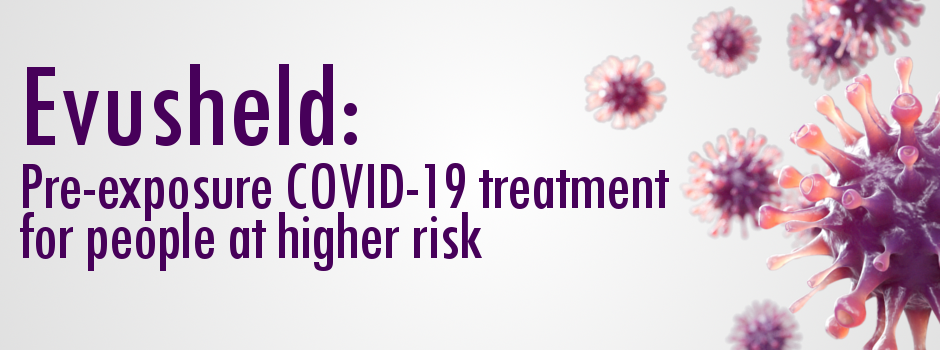
NICE appraisal of Evusheld for preventing COVID-19 – UPDATE
 February 17th, 2023
February 17th, 2023 Nakita Cambow
Nakita Cambow Latest News
Latest News 0 Comments
0 Comments


Evusheld is a combination of two long-acting antibodies (tixagevimab and cilgavimab) that works by binding to the spike protein on the outside of the SARS-CoV-2 virus, the virus that causes COVID-19. This in turn prevents the virus from attaching to and entering human cells.
How does the appraisal process for medicines like this work?
NICE gathers evidence about the medicine from a number of sources including research studies, clinical experts, patients, and groups representing patients. They use this to develop draft recommendations about whether the NHS should use the medicine. People are then able to make comments on the draft recommendations, particularly around whether NICE have considered all of the evidence appropriately and if there is anything they have missed. NICE then meet again to discuss all the comments and review the evidence as necessary, and then make draft final recommendations. People have the opportunity to appeal this decision. If there are no appeals, the recommendations are made final and the NHS decides how they are going to implement them. If there are appeals, these are dealt with before recommendations are made final.
The NICE appraisal committee met in January 2023 and reviewed information from several stakeholders, which included the manufacturer, patients, medical experts, and groups representing patients such as LUPUS UK. Using this information, NICE then made some draft recommendations about whether the NHS should use Evusheld.
NICE published their draft recommendations on 16/02/2023 – you can see them in full HERE.
NICE did NOT recommend the NHS uses Evusheld for the prevention of COVID-19.
Their main reason for not recommending it was that they felt there is limited evidence that it is effective against the current dominant variants of COVID-19.
NICE are developing a quicker process for updating recommendations for treatments for rapidly changing diseases like COVID-19.
This process is likely to be triggered when:
- There is new clinical evidence to consider;
- There are significant changes to a disease, like hospitalisations increase or decrease;
- There is a new variant and medicines are designed to, or likely work most effectively against, a particular variant.
This is particularly important for treatments like Evusheld, as they work most effectively against particular variants. When NICE’s process for making recommendations is too long, the most dominant variant can change during the course of the process, and so a treatment which was effective is no longer effective, or vice versa, by the time they come to make a decision.
There is currently no date on when this will come into effect, as NICE need to work with key groups to finalise the process so that it is safe and useful. The process will include representation from both clinical experts and patients.
What is LUPUS UK’s reaction to the draft guidance?
“Whilst the draft recommendation is not surprising, it is disappointing. There are many people who are severely immunosuppressed and still do not have adequate protection from COVID-19 vaccines. The lack of protection and support for these people is an ongoing public health scandal.
“The current NICE appraisal process is not suitable for approving treatments like Evusheld during an ongoing pandemic with a rapidly changing virus. Unfortunately, the window of time in which it could have been most effective and beneficial appears to have passed.
“The news that NICE is developing a new rapid assessment system for COVID-19 is very welcome. We hope that future treatments can be implemented as quickly as possible, protecting the people most at risk in our community and restoring quality of life after more than three years of shielding.” – Paul Howard, Chief Executive of LUPUS UK
What happens next?
Stakeholders now have an opportunity to comment on the preliminary recommendations and encourage the NICE appraisal committee to consider any additional evidence or equality issues before they make their final recommendations. The deadline for comments is 9th March 2023.
LUPUS UK has submitted a response to the recommendations, which you can read HERE. We are also working with other stakeholders who represent patient groups to respond to this.
The public are also invited to comment on the draft recommendations. You can do this HERE.
The NICE appraisal committee are expected to meet again in April 2023 to review the stakeholder comments and consider the final recommendations. The final recommendations will be published following this meeting, and we will update this page.



 ©2024 LUPUS UK (Registered charity no. 1200671)
©2024 LUPUS UK (Registered charity no. 1200671)